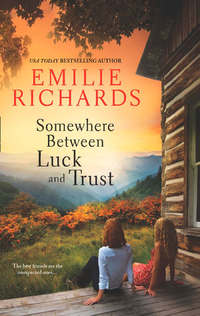
Полная версия
Rising Tides
“Did you know, Dawn? Did you know that your uncle was going to be gunned down like a common criminal? Did you know that a mob was on its way to that church to turn a good man into a saint and a martyr?”
“Look, I’m staying,” Ben said. “I don’t know why I was invited here, but I’m going to stay long enough to get some answers. Can we be civil to each other?”
“You’re a Louisiana boy. You know hospitality’s a tradition in this part of the world. I’ll do my part to live up to it.”
Dawn studied him for another moment. His hair was longer than it had been a year ago, as if he had made the psychological transition from Boston, where he had worked on the Globe, to San Francisco. He wore glasses now, wire-framed and self-important. He no longer looked too young to have answers to all the world’s problems. He looked his full twenty-seven years, like a man who had found his place in the world and never in tended to relinquish it.
Her father was a man who also radiated confidence and purpose. Dawn wondered what would happen when Ferris Lee Gerritsen discovered that Ben Townsend had received an invitation to Grand Isle.
Ben waited until her gaze drifted back to his. “I’m not going to push myself on you.”
“Oh, don’t worry about me. Nobody pushes anything on me these days. And nobody puts anything over on me, either. Stay if you want. But don’t stay because you want to finish old conversations.”
“Maybe there’ll be some new conversations worth finishing.”
She shrugged, then turned back to her car for her lug gage, making a point of dismissing him. She had left al most everything she owned in Europe. She reached for her camera case and her overnight bag, but left her suit case inside.
In the distance, thunder exploded with renewed vigor, and the ground at Dawn’s feet seemed to ripple in response. The sultry island air was charged with the familiar smells of ozone and decay. By the time she straightened, Ben was no longer beside her. She watched as he walked down the oyster-shell drive, glad she didn’t have to pretend to be casual even a moment longer.
She might not have understood Grand Isle’s draw for her grandmother, but each year Dawn had been drawn to it herself. The summers had been a time to bask in her grandmother’s love. Nothing else had been expected of her. The sun had been too hot, the occasional breeze too enticing. She had done nothing of consequence on the island except grow up. But Aurore’s pride in her had been the solid ground that Dawn built the best part of herself upon.
How proud had Aurore been before she died, and what had she known? Had she known that Dawn still loved her? That despite her exodus after her uncle’s death, she had still yearned for her family? That falling in love with Ben Townsend so long ago had not been the same as declaring sides in a war Dawn had never understood anyway?
Most important of all, had her grandmother understood that even though Dawn had crossed an ocean, she had never really been able to break free of any of the people she loved?
Louisiana was a statewide Turkish bath, which might explain the inability of its residents to move forward into the twentieth century. Their brains were as steamed as Christmas pudding, their collective vision as fogged by heat and humidity as the air on an average afternoon. On a day like this one, when raindrops sizzled in the summer air, it was possible to see why nothing ever changed, and nothing was ever challenged.
Ben stood on the beach and watched the foam-tipped breakers rearrange a mile of seaweed. Grand Isle was an obscure sandpile, projecting like an obscene middle finger into water the temperature of piss. In the hour since his encounter with Dawn, he had walked nearly the entire length of it.
Louisiana wasn’t Ben’s favorite place. He had been born not far from Grand Isle, but a year ago he had al most died there, too. A year ago he had watched as a martyr was gunned down by bigots and left to bleed away his life, one drop at a time.
Where was Father Hugh Gerritsen now? Ben didn’t believe in heaven any more than he believed that hell could be worse than Louisiana. Somehow, though, he couldn’t believe that Father Hugh’s life had been over between one drop of blood and the next. Maybe he had come back to earth—for a Catholic priest, he’d been surprisingly eclectic in his theology—and even now was toddling around somewhere, preparing to give humanity’s inhumanities one more run for their money.
What would Father Hugh think of his niece? The woman in the violent purple slicker had certainly looked in need of a priest—or a convent. Her legs were a mile long, her hair was a red-brown sweep ending—not accidentally, he was certain—at the exact tip of her breasts. A year in Europe had taken her from a debutante in flowered shirtwaists to a vixen in a pop-art miniskirt.
And those eyes, those challenging, provocative eyes. She had learned to use them, too. She had gazed straight through him as if he had never been her lover. As if he had never accused her of participating in her uncle’s murder.
Hadn’t he known that she would be shocked to see him, and that shock would turn to anger? Maybe. But he hadn’t expected the ice-cold arrogance, the chip on her shoulder as massive as one of the island’s oaks. Whatever Aurore Gerritsen had planned for them, it wasn’t this instant animosity, this reduced equation of a relationship once rich in respect and love.
In the distance, against the stark silhouette of an off shore oil platform, Ben watched fishermen hauling in a circular net filled with the shining, flopping bodies of mullet. Their boat rode the waves, and the net dipped and lurched as they dragged it on board. He winced, empathizing with the mullet who were gasping their last breaths as they struggled to free themselves from a force they couldn’t understand.
He didn’t understand Dawn, and he didn’t understand her grandmother or her reasons for inviting him here. He didn’t understand the malaise that surrounded the Gerritsens’ lives, or how they had failed to detect it. Worse, like the mullet, he didn’t know how to fight what he couldn’t see.
The sun had nearly disappeared. Now, banked behind thunderclouds, it glowed just a short distance from the horizon. Ben knew it was time to return to the Gerritsen cottage. He had given Dawn enough time to get used to the idea that he was back in her life. He had probably given her parents time to arrive, and anyone else who had been invited, too. He trudged across sand and crunched his way through a fifty-yard stretch of wild flowers and sea grasses. Ozone and the herbal essence of the vegetation scented the air. Behind him, as a light rain began again, he heard the triumphant cawing of sea gulls feasting on the mullet the fishermen had missed.
He was halfway back to the cottage when the heavens opened and the rain began in earnest. He was al ready wet, but with darkness falling, his tolerance was disappearing fast. The main road bisecting the island was lined with fishing camps and the occasional store that served them. He headed for the closest one to wait out the worst of the storm.
Ten steps led up to the wood-frame building, which was no larger than a three-car garage. Inside there were two narrow aisles flanked with counters and shelves. Of more interest were the occupants.
The storekeeper was lounging against the counter. A man who’d embraced his fifties without an argument, the storekeeper was balding, stooped and paunchy. When he smirked at the younger man who was standing across from him, his tobacco-stained teeth were an inch too long.
So enthusiastically was he staring and smirking, the storekeeper didn’t even notice Ben. “Well, boy,” he said to the man in front of him, “I might know where the house is, and I might not. Depends on why you want to know. Me, I can’t figure why a nigger’d be looking for Senator Gerritsen’s house after dark, unless he’s got something on his mind he shouldn’t.”
Ben stood in the doorway and watched the other man—a man who, at thirty-seven, hadn’t been a boy for two decades—react to the storekeeper’s words. Ben recognized him. He waited for his reaction.
Phillip Benedict leaned across the counter. “Now if I wanted to kill Senator Gerritsen, coon ass, you think I’d stop here first so you could remember exactly what I looked like?”
The storekeeper cranked himself up to a full five-foot-four, but he needed an additional ten inches to be Phillip’s equal. Actually, Ben concluded, he needed a whole lot more than inches.
“Get out of my store! Go on. Get! And watch your back while you’re on the island. Might find yourself riding the waves facedown if you don’t!”
Phillip had beautiful hands, long-fingered and broad. One of them gathered the material of the storekeeper’s shirt and twisted it so that he couldn’t move away. “It would take a very quiet man to sneak up on me, coon ass. You don’t have that kind of quiet. You got a big mouth. I’d hear it yapping a mile away. So you be careful, ‘cause while you’re yapping, I might just sneak up on you. And you wouldn’t hear me.” He let go of the shirt and pushed the man away from the counter. Then he turned. His eyes met Ben’s. For a moment, he didn’t move.
“Coon ass?” Ben asked.
“Wish I’d coined the phrase.”
Ben looked past Phillip to the storekeeper, who was edging toward the wall. “He’s a mean son of a bitch,” he told the man. “Eats white folks for breakfast, lunch and dinner. Now, I’d be careful. All that, and a friend of the Gerritsen family, too. He’s a good man to stay away from.”
“Both of you get out!”
“Bad for business to be so rude.” Ben picked up a candy bar and fished for some change, which he laid on the counter. “Want anything, Benedict?”
“Yeah. A head on a platter.”
“Next store down the road.” Ben draped an arm around Phillip’s shoulder. “Let’s see what we can do.”
They exited that way, although Ben kept his eye on the storekeeper until they were safely out the door. “About now is a good time to make tracks,” he said at the bottom of the steps. “Do you have a car?”
“Sure as hell didn’t hitchhike.”
“Let’s go.”
When they were both in the car, Phillip pulled onto the road, and they were quiet until he’d taken one of the turns off the main route and parked in front of the is land’s Catholic church. Phillip was the first to speak. “Sun’s going down, white boy. Ain’t safe for niggers or agitators on a backass Looziana road.”
“What in the hell are you doing here?”
Phillip lifted a brow. “I could ask the same.”
Ben tried to imagine how he could explain something he didn’t understand himself. In the meantime, he examined the other man.
Phillip Benedict was a journalist of note. He was widely praised for his insight and biting commentary, but it was his color and his convictions about prejudice and freedom that set him apart from other Ivy League—educated newsmen. From jailhouse interviews with Martin Luther King to his assessment of the achievements of the late Malcolm X, Phillip had reported the struggle for civil rights like a war correspondent. More times than not, he had been right in the thick of battle.
The two men had liked each other from their first encounter, years before. They had been covering the same story in New York, Ben as a young reporter right out of college and Phillip as a seasoned journalist. They had spent a long night together in a Lower East Side bar along with half a dozen other newsmen, waiting for someone to emerge from a building across the street. Phillip had taken Ben under his wing, and with hours to kill they had traded their personal stories. But over the years they hadn’t spent much time in each other’s presence, and over the past year none at all. Their lives and their careers had taken them in different directions.
“I’m not exactly sure why I’m here,” Ben said. “But I was invited to the reading of a will. You?”
“Seems I’ve been invited, too. Aurore Gerritsen was one interesting old lady.”
Ben shifted so that his back was against the car door. He had known from the conversation in the store that Phillip’s presence on Grand Isle had something to do with the Gerritsen family, but he hadn’t really expected this. He had guessed that Phillip was looking for a story.
Or feeling suicidal.
Raindrops glistened in Phillip’s hair and on the dark hollows of his cheeks. He didn’t look any the worse for his confrontation with the storekeeper. In fact, he looked like a man waiting for new challenges. “This is getting stranger by the moment,” Ben said. “Why you?”
Phillip smiled. “You told the man. I’m a friend of the family.”
“I was just trying to keep your ass in one piece. What’s the real reason?”
Phillip shifted, too, trying to make room for his long legs. “Are you entertaining theories?”
“Yeah, and you could entertain a whole lot more than that by coming to a place like Grand Isle and manhandling the locals.”
Phillip took his time looking Ben over before he spoke again. “Do you know why you were invited?”
“How much do you know about the Gerritsens?” Ben reached into his shirt pocket for the Butterfingers he’d bought at the store. He ripped it open and broke it in two, offering half to Phillip.
Phillip declined with a shake of his head. “I just know what I’ve been told.”
“How much do you know about Father Hugh Gerritsen?” Ben asked.
“I know he was killed last year. Over there in Bonne Chance.” Phillip hiked his thumb over his shoulder.
“Yeah. A short sail, or a hell of a trip by car. I was born there, and sometimes I wake up in the middle of the night and I’m there again. I can feel the heat and the damp settling all over me, and I’m back in Bonne Chance.”
“You were there when he died, weren’t you?”
Ben wasn’t surprised that Phillip knew. They had never talked about it, but the story had been covered in the national media. “I was there. But there’s more to it than that. His niece and I…” He shrugged. “Dawn and I were close.”
“That right?”
“All I really know is I’m here, and I’m planning to stay.”
“So am I.”
“You’ve avoided telling me why you were invited.”
“I don’t know for sure.”
“But you could guess if you had to?”
“I got to know Mrs. Gerritsen at the end of her life. My being here has something to do with that.”
“Do you know anybody else who’s coming?”
Phillip gave a half smile that Ben could have interpreted a hundred different ways. “My mother and step father.”
Ben gave a low whistle. He had never met Phillip’s family, but he had heard Phillip’s mother sing a thou sand times. She was Nicky Valentine, a world-famous jazz and blues singer who owned a nightclub in New Or leans.
“Got their invitations the same day I got mine,” Phillip said.
Ben had a hundred questions, but Phillip had a journalist’s natural reticence. Ben would get his answers when they all gathered back at the cottage. “This is going to be even more interesting than I thought.”
Phillip’s smile hardened into something else. “Especially when the senator and his wife find out who’s been invited to their house.”
“I wouldn’t turn my back on him, if I were you.”
Phillip swiveled in his seat and reached for the ignition. “We’ve got questions, both of us, and they need answering. Maybe it’s time we found out what’s planned. But whatever it is, it’s not going to be boring. There’s a story here. Dark and light folks, tapping together to an old lady’s song.”
Ben was silent as Phillip started the car. The rain had slacked off again, but the sky was almost dark. He imagined that everyone who had been invited to hear the will was at the cottage by now. Maybe Phillip was right. Maybe a story would unfold in the next hours. But one thing was for certain. During her lifetime, Aurore Le Danois Gerritsen had been a woman to reckon with. Even now, even in death, she was still determined to have her way.
CHAPTER TWO
At seventy-four, Spencer St. Amant should have had nothing to worry about except whether an afternoon thundershower was going to keep him from taking a stroll down Esplanade Avenue. But while his cronies gathered at the Pickwick Club and talked incessantly about their days in the sun, Spencer sat in his Canal Street law office and directed the parade of fresh-faced Tulane graduates who did his legwork.
He had considered retirement once, a decade before. In a private dining room at Arnaud’s he had thought it over between courses of shrimp remoulade and trout meunière. And when the last bite of trout was vanquished, he had walked back to his office and announced to his staff that the jockeying for position could cease immediately. Someday they would find him at his desk, facedown amid volumes of the Louisiana legal code. Until then, he was still in charge.
Spencer doubted that anyone had ever suspected the reason for his decision. He wasn’t married to the law, and most parts of mediating society’s quarrels didn’t appeal to him. As a youth, he had wanted to fly. He had dreamed of soaring above the clouds like the Wright brothers, exploring every corner of the world stretched before him. Instead, he had stayed on the ground to fulfill his duty to his family.
His duty to the long-dead St. Amants who had taken such pride in the family firm had been discharged long ago. But his duty to the woman he had loved had not. Aurore Gerritsen had never known that he continued his law practice to stay close to her side. She had died his friend and client, more than he could ever have hoped for if he told her the truth.
His duty to her was not yet ended. There were still her last wishes to fulfill. One final act of love.
Despite the rain, Spencer moved slowly up the path to the Gerritsen cottage. As he drew closer, he was re minded of the first time he had gone up in an airplane. The airfield had once been acres of corn, and as the flimsy two-seater began its take-off, he had been thrown from side to side. Decades had passed, many more than he cared to think about, but he still remembered that moment of terror when he had realized that his life was about to be transformed, that something more than a plane had been set in motion and couldn’t be halted.
On the front gallery, he knocked and waited. At the sound of footsteps he waved to his driver, who had al ready deposited his suitcase by the front door. The young man promptly backed down the drive and disappeared with a squeal of Spencer’s own tires. Spencer held himself erect—a considerable feat—and stood back as Pelichere Landry came outside to greet him. She was a stout woman with the dark hair of her Acadian ancestors and an unswerving and clear-eyed devotion to Aurore Gerritsen. She, and her mother before her, had taken care of the Gerritsen family for as long as Spencer had known any of them.
“I’m glad to see you standing there,” he said. “I didn’t know who would be here.”
“Mais yeah, I can tell that.” Pelichere stepped away from him so that she could get a better look.
He felt her appraising gaze and tried to stand a little straighter. “I’m fine.”
“You don’t look so fine.”
“Before I get any surprises, you’d better tell me. Is anyone else here yet?”
“Dawn’s up in her room. I made her eat. Ben Towns end, he came. He went.”
“He’ll be back,” Spencer said.
“The others are coming? Still?”
Spencer nodded.
“Aurore, she always did what she thought was best. Even when it wasn’t.” Pelichere picked up Spencer’s suitcase. “Your room’s ready, and there’s coffee in the kitchen.”
The sound of a car engine chased the lure of both from Spencer’s head. He turned as a dark, sleek Lincoln came to a halt under the oaks. “The senator,” he said, although he was sure Pelichere already knew that.
“Me, I’ve got other fish to fry.” The door banged shut behind Pelichere, and Spencer was left alone to greet Ferris Lee and Cappy Gerritsen. He watched as Ferris got out to open the door for his wife.
Ferris Lee Gerritsen wasn’t classically handsome. He was barrel-chested and broad-shouldered, with a high forehead and gray hair that was still thick enough to require a good haircut. His nose had been broken more than once, and the arrogant thrust of his chin had invited punches, too.
But what was the exact shape of a nose, the cut of a jaw, compared to personal magnetism? He had eyes that crackled with patriotic fervor and a resonant voice that could stroke or destroy. Combined with a rare understanding of the hopes and prejudices of his constituents, his charisma could usher him into the governor’s mansion in 1968.
Cappy Gerritsen, blond and petulant, was dressed as if she were setting out for an afternoon of bridge and gossip. Her white linen shift stopped just above her knees, but it wasn’t short enough to be in poor taste. Many things could be said about Cappy, but never that her taste was poor.
Ferris wasted no time on pleasantries. He spoke be fore he reached the porch. “Maybe we can get down to business before this place is blown to Hades and back.”
“I listened to the forecast on my trip down,” Spencer said. “There’s nothing to worry about yet. Maybe not at all.”
“I’ve tried to reach you a dozen times in the last few days.”
“Have you?” Spencer knew full well that a dozen was a low estimate.
“I don’t understand the point of this. I’m supposed to be in Baton Rouge this week. Why couldn’t we read the will in New Orleans?”
“I’d rather talk about the reasons when everyone’s here.”
Ferris’s expression had been anything but cordial; it grew less so. “And just who’s expected?”
“I’d like to know if my daughter’s arrived,” Cappy said, before Spencer could answer.
“Dawn is here, though I haven’t seen her yet.”
“Well, at least she hasn’t entirely forgotten she has a family.”
Spencer watched Ferris silence his wife with a frown. “Suppose you forget about everybody else for a minute,” Ferris said, “and tell me exactly what’s going on?”
“I’m following your mother’s wishes. That’s all I can say.”
“That’s all you will say. I—” Ferris’s gaze went from Spencer’s face to the drive. A small car, one of Detroit’s newer compacts, was approaching the house.
Spencer wished he had a chair. He also wished for a Ramos gin fizz, although the days when it would have agreed with him were long over. “And who’s this?” Ferris asked.
Spencer watched a tall man unfurling himself from behind the steering wheel. As Phillip Benedict approached, Spencer admired the elegant posture, the strong, even features.
Ferris answered his own question. “Ben Townsend.”
Until that moment, Spencer had noticed only one man; now he switched his gaze to the other. Ben was nearly as tall as Phillip, with the same lithe confidence of movement. The confidence of the young.
Ferris stepped forward. Ben thrust his hands in his pockets and rocked back on his heels. He assessed Ferris before he spoke. “Good evening, Senator Gerritsen.”
“You’re not welcome here.” Ferris didn’t look at Phillip. “Neither is your…friend.”
Spencer crossed the porch before Ben could respond. He extended his hand to Phillip. “Phillip.” Then he turned to Ben and held out his hand. “I’m Spencer St. Amant. Thank you for coming.”
“Hasn’t this gone far enough?” Ferris asked. “I want to know what this is about.”
“Well, I’ll tell you what it’s about, Senator,” Phillip said. He smiled pleasantly, although he was carefully assessing everyone as he spoke. “My name’s Phillip Ben edict. Your mother invited Townsend here and me to hear her will. Now, sure as you’re her representative in the land of the living, I know you’re going to make us right at home.”
“You could never feel at home here.”
“As your mother’s attorney, I welcome Ben and Phillip in her name.” Spencer turned away from Ferris and Cappy, to signal that his business with them was completed. “I just got here myself, but I know there have been beds prepared for you.”
Phillip’s reply was drowned out by the sound of an other car. Both young men turned to see who was coming. Spencer watched a late-model Thunderbird pull up the driveway. No one said a word as the car stopped be side Phillip’s and its two occupants got out. Phillip stepped forward as a man and woman walked slowly to ward him. “Hello, Nicky,” Phillip said.







